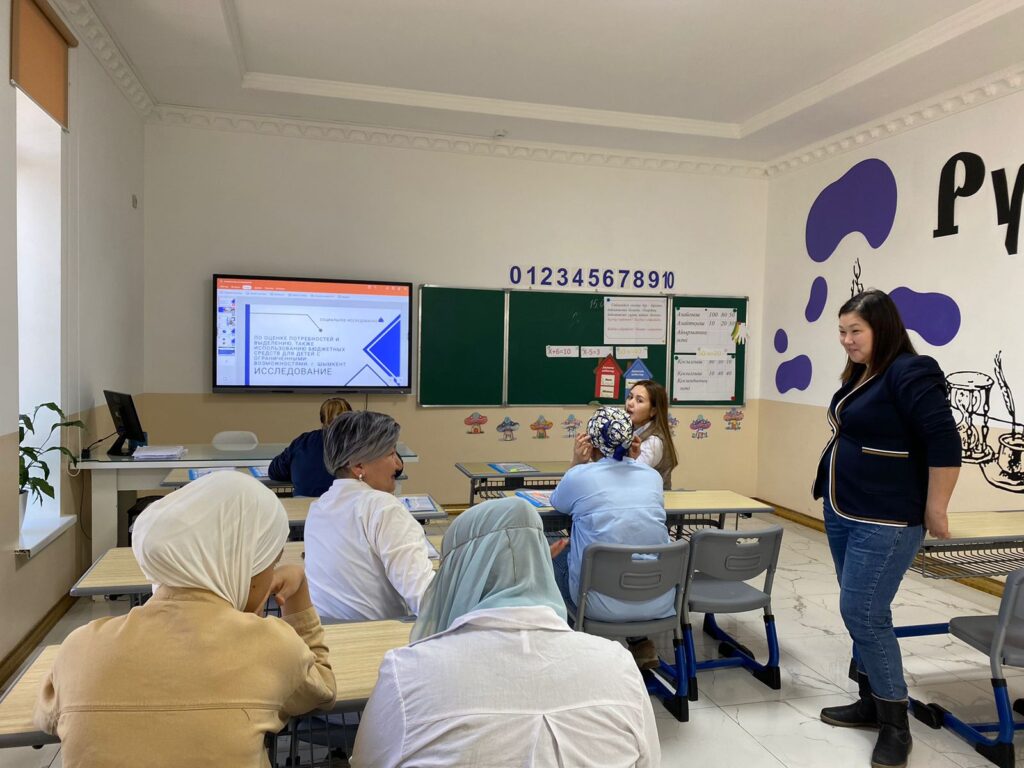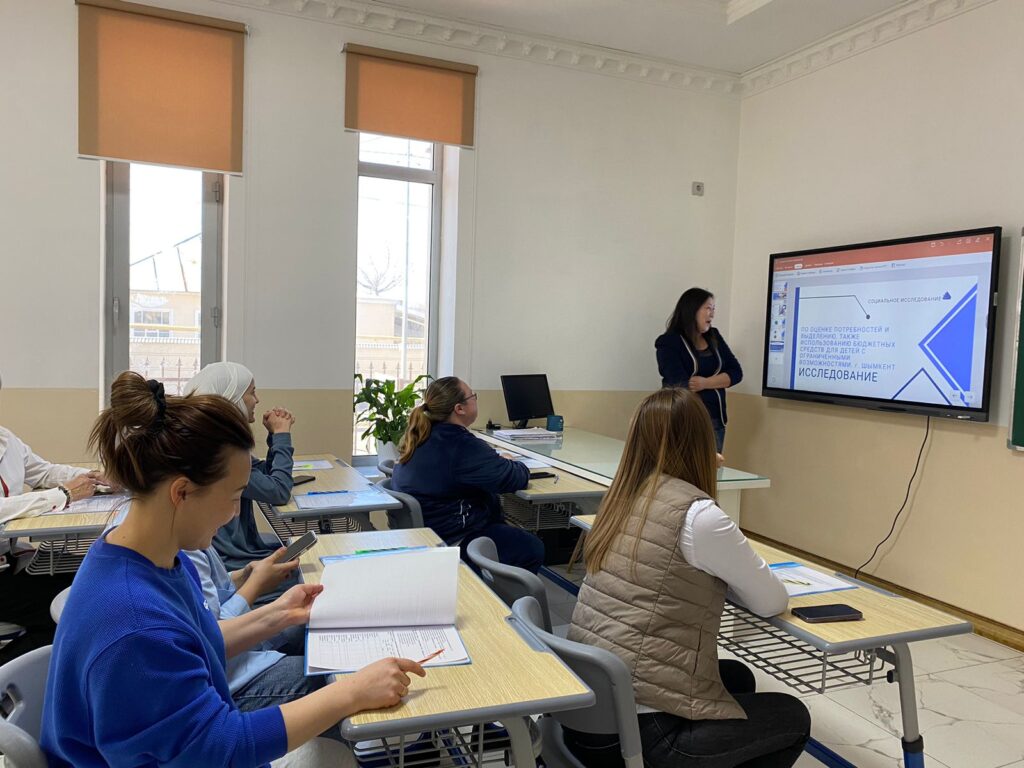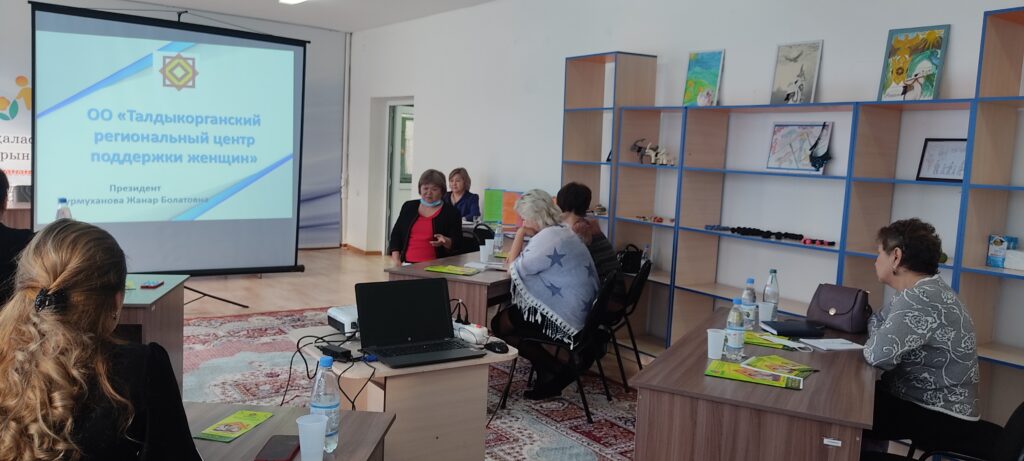Project Report: How Best to Support Children with Disabilities?
SGS 2023 Grantee: Taldykorgan Regional Women’s Support Center, Shymkent, Kazakhstan.
Project: Assessment of funding and services for children with disabilities and their accessibility.
Here is their report:
“Research – Assessment of Needs for the Allocation and Use of Budget Funds for Children with Disabilities” was carried out by the NGO Taldykorgan during the period February-July 2024. The research involved an evaluation of the effectiveness of various programmes and initiatives aimed at improving the quality of life for children with disabilities. It focused on social services for families raising children with disabilities in the Zhetysu Region, Akmola Region, and Shymkent City.
The main goal of the project was to study the needs of children with disabilities in these areas, and to evaluate existing services to establish strategies for government bodies concerning the development and improvement of social services for at-risk children and their families.
The needs assessment was carried out in several stages:
Stage 1 – Preparatory: At this stage, the research programme was developed, resources for conducting the study were identified, methodologies and research schedules were designed, and the tools were piloted.
Stage 2 – Field: This stage involved the direct assessment of needs. It included both desk and fieldwork for data collection according to the developed methodology. Official requests were sent to the Departments of Employment and Social Programmes Coordination in the Zhetysu region, Akmola region, and the city of Shymkent. Additionally, surveys (personal interviews) were conducted with parents raising children with disabilities in the same areas, with a total of 161 parents surveyed in 15 settlements.
Stage 3 – Analysis of Data Collected, Preparation of Report, and Recommendations: During this stage, statistical processing and analysis of primary data were carried out according to the analysis methodology to identify specific social phenomena, etc. A report was prepared based on this analysis.
Stage 4 – Dissemination of Research Results: This involved presenting the monitoring results to local executive bodies and interested audiences, as well as organising publications to inform the community about the research results.
By the end of the project, significant results had been achieved, including the development of a methodology that allowed us to organise and conduct an assessment of the needs and
requirements for the allocation and use of budget funds for children with disabilities in practice. Relevant recommendations were developed for local executive bodies to make appropriate decisions aimed at improving the situation.


However, despite these successes, we also faced several challenges. As with any project, implementation was not without difficulties, requiring special attention. The main issues encountered were:
Data Collection:
- Lack of Statistical Data: Currently, there is an issue with insufficient statistical data on children with disabilities, and there is no centralised database. Responses from government bodies were vague and without the data specifically requested.
- Survey Difficulties: Parents or guardians were reluctant to participate in surveys and provided incomplete information.
Logistical Problems:
- Access to Respondents: Difficulties in reaching the target audience, especially in remote or rural areas.
- Funding: Lack of financial resources to conduct a large-scale study.
- Timelines: Extremely tight research timelines made it difficult to complete the work.
These problems will be taken into account in future projects, and thorough planning and careful approaches will be applied during the development and conduct of research.
In conclusion, it is worth noting that the needs assessment process developed should become a regular practice for many government bodies—both local and central. Such work will allow
timely and data-driven decision-making aimed at addressing identified gaps in service provision. Conducting needs assessments also requires a dialogue with the population and the involvement of civil society organisations. Such an assessment would help implement the concept of a “Listening State” voiced by President Tokayev, and allow for the more effective building of relationships in a fair and new Kazakhstan.

Contact:
Olga Skoblyashova
Project Coordinator
Taldykorgan
Shymkent, Kazakhstan
womencenter@mail.ru
Instagram: @womencenter_taldyk
Facebook: ОО “Талдыкорганский региональный центр поддержки женщин”

